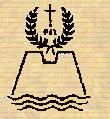|
THE SHEPHERD and
THE SHEEPFOLD
Christ says that
He is the Shepherd. And if we are His sheep we must follow Him and enter
the sheepfold through the gate and not through another way. Then He warns
us of thieves and brigands who would try to steal our souls by offering
another way into the sheepfold. Of course, there is no “another way”.
St. John Chrysostom describes these thieves as well-intent Christians who
do not really know the gate and think that climbing the wall is the way.
They teach Christ’s doctrines but not to the full. They teach virtues and
condemn vices. They quote Christ and even dare to say that joining and
remaining in their sect is the assurance of salvation.
In their good desire to attract many to Christ, they water down Christ’s
teachings and make it sound easy. They sound Christian but are not
Christian enough. They adjust the teachings of Christ to make it
attractive, dealing more on the fulfillment of worldly desires and physical
well-being rather than the things of heaven.
Christ warns us of such kind because they are thieves bent on stealing
souls away from entering the only gate.
What is important in the gospel is for us to be sheep. The sheep are
predestined to go to heaven, the goats to hell. The sheep are never lost,
though sometimes they are lost for a while; but eventually they are saved,
precisely because they are sheep.
Though the gospel did not state how we can become sheep--that is found
elsewhere--it shows us the signs of a sheep as differed from a goat.
Whenever the commands of Christ are explained, the goat seems to hear
nothing and learn nothing. The sheep believe that the learned commands of
Christ must be obeyed, though at first they lack understanding. It is this
lack of understanding that makes them ponder the meaning of the command in
their hearts. It is their pondering that makes them knock for which God
opens their minds to understand.
When Christ explained the sheepfold and the gate, they believed and saw the
importance of entering the one gate and not through another way. But they
did not understand, the Gospel says. So Christ had to explain further.
Goats do not ponder, therefore, hear nothing. Mary, the mother of Jesus,
always pondered things in her heart.
Secondly, the sheep knows the voice of Christ and never listens to
strangers. They know what teachings are in accordance to the commands of
Christ. The moment they hear anything contrary to Christ’s teachings, they
know it to be so and do not listen. Goats listen to anybody who says what
they want to hear.
The third and most reliable sign of a sheep is perseverance in the quest
for holiness. The sheep perseveres in coming to the full knowledge of the
commands of Christ; they persevere in obeying the commands of Christ. If
occasionally they are ‘lost’ it is usually because they find the commands
of Christ distasteful. So they hesitate for a moment, which makes them
lost. Like the prodigal son, they return immediately to the commands they disliked
and had neglected, and live by it.
The going in and out from the sheepfold is the symbol of Christ leading us
into contemplation; and then Christ leading us out to do His will in good
works. In both cases, Christ leads us. We don’t do these things on our own.
St. John Chrysostom. On the Gospel of John
(updated 02-09-02)
|
